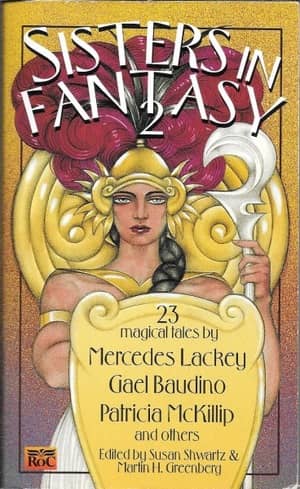Birthday Reviews: Valerie J. Freireich’s “Vashti and God”

Valerie J. Freireich was born on July 21, 1952.
Freireich has written four novels in her Harmony of Worlds series, beginning with the Compton Crook Stephen Tall Memorial Award-nominated Becoming Human. Her short story “Sensations of the Mind” was a quarterly winner of the Writers of the Future Award in 1991.
She wrote “Vashti and God” for Susan Shwartz and Martin H. Greenberg for the anthology Sisters in Fantasy 2. Published in 1996, the story has never been reprinted.
In the Biblical book of Esther, Queen Vashti only appears in seven verses of the first chapter and is mentioned in two verses of the second chapter. Despite this, or perhaps because of it, her character is something of a tabula rasa. Vashti’s refusal to appear before King Ahasuerus has led to her being adopted by some as a feminist icon. In “Vashti and God,” Valerie J. Freireich fleshes out Vashti’s story and motivations in support of a more feminist interpretation.
The story is told mostly in flashback after Vashti has been removed as the queen and made a maid in the Great King’s household, where Esther now sits in her place. The flashbacks detail the seven days of feasting that lead up to Vashti’s demotion. During that time, as Vashti realizes more and more that the woman are segregated and unimportant to their husbands, she also begins to hear a voice spurring her to take action and she demands that her husband invite the women to join their husbands on the last day of the feast. When he commands her attendance, and only her attendance, she refuses to come, leading to her punishment and replacement.
However, the voice, which she attributed to the Persian god Ahuramazda, wasn’t done with her and begins to tell her to support Esther’s own dealings with the Great King. Although Vashti complies with the god’s request, she also comes to realize that the commands weren’t coming from Ahuramazda, nor were they for the benefit of women, Vashti, or the Great King, but rather they were the commands of Esther’s god and all she could do was warn her ex-husband that he should not try to interfere with Esther’s god’s plans if he wanted to thrive.